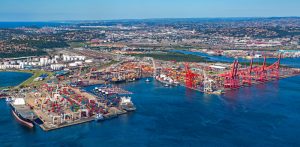 Infrastructure development will be a vital tool in stimulating provincial economic growth in the Western Cape over the next 12 years, strategically leveraging procurement to optimise the impact, says Provincial Minister of Infrastructure, Minister Tertuis Simmers.
Infrastructure development will be a vital tool in stimulating provincial economic growth in the Western Cape over the next 12 years, strategically leveraging procurement to optimise the impact, says Provincial Minister of Infrastructure, Minister Tertuis Simmers.
Speaking at SmartProcurement’s 10th Annual Western Cape Procurement Conference last month, Mr Simmers told his audience of procurement specialists and officials from both the private and public sectors, that the launch just a few days before of the WC government’s Growth for Jobs Strategy promised big things to come.
The Minister started his address by congratulating SmartProcurement and its partners and sponsors on a decade of successful conferencing which has proved to be a most welcome platform to deliberate on supply chains, with a focus on energy supply challenges, and building strategic procurement and partnerships to drive delivery and change. He continued:
“Some of you would have seen in the news yesterday that we launched the Growth for Jobs Strategy for the Western Cape, which has the vision of fostering a jobs-rich, inclusive, sustainable and resilient provincial economy. The strategy aims to achieve real-term economic growth between 4 and 6 percent per year by 2035. Infrastructure development plays a crucial role as it creates job opportunities, drives investment and enhances overall development.
“For the Growth for Jobs Strategy to be successfully implemented, robust procurement regulations and practices are indispensable. Effective procurement mechanisms ensure that infrastructure projects are executed efficiently, transparently and are in alignment with our economic growth targets. By leveraging procurement strategically, we can optimise our resources and investments to have a meaningful impact on economic growth and job creation.
“Some of the most significant forces shaping our world today are innovation, digital disruption and rapid change. Added to this are supply chain disruptions which have become a global phenomenon. In today’s fast-paced world, these elements are the driving forces behind progress, growth and success.
Innovation, digital disruption and rapid change
“Change is inevitable. Evolution, however, is optional. This powerful statement resonates with the essence of progress and innovation. I would like to take a moment to reflect through the lens of music the magnitude of transformation that we have experienced over the decades. The evolution of music devices reflects technological advancements and our capacity to adapt to change. In the 19th century, the gramophone revolutionised the way we experienced music, and for nearly 90 years, it remained the primary means of listening to music.
“The arrival of CDs in the 1980s marked a significant milestone in the history of music consumption, as it quickly took over the market. Within two decades, the world witnessed another paradigm shift as the digital era dawned upon us and music became intangible with streaming services, downloads and online platforms. The power to carry a vast library of songs in our pockets became a reality, redefining how we interacted with music.
“The evolution of music devices serves as a metaphor for the broader picture of change and adaptation that all industries and individuals face. Change happens constantly, and those who evolve with it are the ones who lead the way into the future. We have witnessed this evolution not only in music but also in other aspects of our lives, from communication to transportation and beyond.
“As individuals and as organisations, we must ask ourselves: Are we merely accepting the inevitability of change, or are we actively evolving to stay relevant and seize the opportunities that change presents? Embracing evolution is about envisioning possibilities, exploring new avenues, and embracing innovation. It is about recognising that the status quo is not enough, and continuous improvement is essential to thrive in an ever-transforming world.
Supply chain disruptions and procurement
“This brings me to talking about supply chains which are the backbone of our economies, connecting producers and consumers across the globe. They have enabled us to enjoy an unparalleled variety of goods and services at competitive prices. However, in recent times, we have witnessed the vulnerability of these complex networks to disruptions caused by natural disasters, geopolitical tensions, global health crises and unforeseen events.
“Such disruptions can have far-reaching consequences affecting businesses, governments and citizens. The private sector plays a critical and multi-faceted role in supply chains to ensure smooth operations and in addressing supply chain disruptions. In the public sector, procurement plays a central role in ensuring the steady flow of essential goods and services to fulfil government’s functions and meet public needs.
“During supply chain disruptions, the importance of effective and sustainable procurement practices becomes evident. Government must be prepared to respond swiftly to unforeseen challenges and ensure the continuity of essential services. Sustainable public procurement is an integral part of sustainable economic growth.
The Western Cape Government and its Department of Infrastructure
“Addressing public sector procurement issues is a key priority for the Western Cape Government as we strive to foster transparent, efficient, and accountable procurement practices. By enhancing procurement regulations, systems and capacity, we aim to reinforce the positive impact of government-citizen interactions and ensure the delivery of services that align with our commitment to responsible governance.
“Strategic procurement ensures that projects are delivered on time and within budget AND it contributes to building a sustainable and inclusive economy. By supporting local businesses, prioritising environmentally friendly practices and promoting social responsibility, procurement can have a transformative effect on communities and industries within the province.
“As the Department of Infrastructure, we play a critical role in managing the budgets allocated to provincial departments for infrastructure projects. One of our key responsibilities is to actively participate in shaping procurement legislation and regulation, specifically engaging in the process around the Procurement Bill and its intended regulations. Through our involvement, we aim to influence procurement practices to align with our vision of responsible and effective governance.
“Furthermore, we will advocate for the active institutionalisation of the Prevention and Combatting of Corrupt Activities Act. This step is essential to address the current legislative gap, as it does not adequately protect government institutions during open tender procurement processes. By embedding anti-corruption measures within procurement practices, we seek to promote integrity, fairness, and accountability in the public sector.
“Added to the above, in our 2050 Western Cape Infrastructure Framework, we will support all aspects of Infrastructure growth and development in the Western Cape, by:
- Creating a conducive infrastructure regulatory environment, as well as investment in renewable energy and digital infrastructure. This will lay the groundwork for shifting our infrastructure trajectory in the short-term.
- In the medium-term, we will strengthen provincial integration by improving transportation networks, energy grids and digital connectivity.
- Moving into the long-term, our goal is to build resilient infrastructure systems in our towns and cities.
Sustainable procurement is the foundation to achieving these objectives.
“Indeed, the impact of sustainable procurement should not be limited to the actions of Government alone. It should permeate throughout all partner facets, including local government, the private sector, small and medium-sized enterprises and communities. For us, smart procurement goes beyond merely enacting smart legislation; it is about fostering smart partnerships.
“This means that the challenges we face are not solely about financial resources; they require a different way of transacting between the private sector and the government. It involves bringing together diverse resources, skills, funds, opportunities, capabilities, and knowledge to create a transformative landscape that shapes the kind of future we aspire to achieve. Smart procurement is about securing goods and services, and it is about purposefully creating opportunities for positive change.
In conclusion:
“Investment in infrastructure is a potent catalyst for targeted economic growth, presenting numerous opportunities to uplift the well-being of the communities we serve. Our mission is to place the citizen at the centre of everything we do. By constructing roads that unlock economic potential, providing human settlements to restore dignity, and establishing schools and hospitals to offer critical infrastructure access, we are building a foundation for a better future.
“I ask you to join me in rethinking and reconceptualising government procurement models for delivery in the infrastructure space. As we progress, let us not be left behind, but rather choose to embrace evolution and transformation. By working together, we can create a future where our communities thrive and flourish, where access to essential services is ensured, and where opportunities for prosperity abound.”























